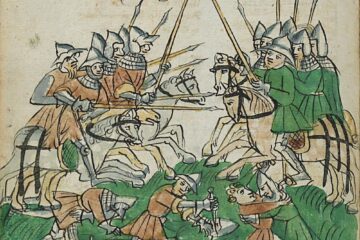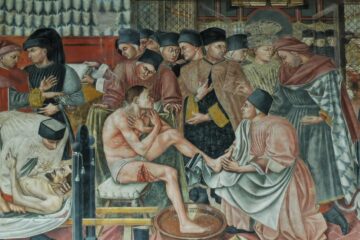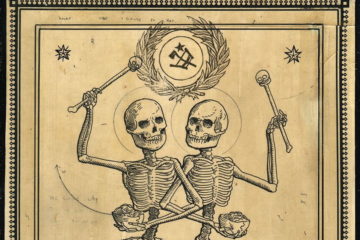by Mother Agnesop, Chaplain of St. Leena’s Cathedral in Rosewood
Greetings and blessings be upon you. I hope this book finds you in good health. I am writing primarily to the priests of St. Leena’s cathedral, although the subject should be good for anyone to read and learn from. Some of you may find these teachings obvious, but some may find use from them. This book deals with two primary ways we are separated from God and how we may overcome this distance. One barrier we create ourselves through sin, and one bridge that the Lord invites us to cross by faith.
By sinning, we willingly separate ourselves from the Lord. He gave us a simple list of things not to do, and by transgressing against him we reject Him as the Lord of our lives. We must repent from these sins and confess them, and by receiving forgiveness, we are able to rejoin with the Lord and his flock. We are reconciled with the Father After we have confessed, we may participate in the Eucharist. The Eucharist is the Lord’s promise to us of the new covenant. By partaking in this holy communion, we remember the sacrifice that the Son made. By joining with Him in faith, we are able to further our walk and find our way to the Father.
Reconciliation
By confessing our sins before the Lord, He grants us forgiveness and reconciles us with His path to salvation. Although it seems simple, it is extremely important. The road to hell is created by unconfessed and unrepented sins. We must be diligent in our efforts to keep track of our sins and repent for them, otherwise, the Father may reject us on that fateful day when we end up before His throne in Heaven.
When the Lord gave the keys to the kingdom to Saint Peter, He granted Peter the ability to absolve the sins of Christians. The Father forgives the sins of those who have had those sins absolved in this way. The Pope has seen fit to give this power down to the priesthood. Through this power, priests and those above in the preachment rite of ordination can administer the confession.
During the confession, the confessor will approach the priest. The priest should start by blessing the confessor rather than holding them in contempt. Confessions are a holy and ordained process, not a method by which priests can hold themselves above others. When the confessor confesses their sins, the priest should offer a way for the confessor to repent. This may be as simple as a sincere effort to stop the sin or may be as complex an action as the priest sees fit. As long as the confessor agrees to the repentance that was suggested, the priest then absolves the sin, completing the process. In this way, the Lord forgives sins of those who have been absolved and we are able to bridge the gap that we have created by our own wrongdoing and once again walk in stride with the Lord. Although it is only required to be done once a year. I highly encourage everyone to confess their sins as often as they commit them. In this way, all stumbling blocks are removed. It is also important that priests remember to confess their own sins. All clergy except the Pope must participate in this important sacrament.
Eucharist
Once we reach neutral ground by confessing and repenting our sins, we can take the additional step toward the Father by participating in the Eucharist. This is our own version of the Passover meal in which the Old Testament Jews celebrated the many blessings that the Lord had showered upon them. The blessing we celebrate is the one Jesus gave us by his sacrifice on the cross. When He was celebrating the Passover meal with his disciples at the last supper, Jesus broke the bread and poured the wine, declaring that the bread was his flesh and that the wine was his blood. He instructed his disciples to eat both in remembrance of Him.
In the same way, when we partake of the bread and wine, we do so in
remembrance of the great sacrifice he made in order to reconcile with the Father. Each time we take this sacrament, we renew our promise of faith and belief in Him as Lord of our lives.
Priests have been given the power to bless the bread and wine, and when
blessed they become the flesh and blood of Christ. A priest must also serve the meal, someone not ordained in the rite does not have the authority to do so. In addition, someone who has sinned and not confessed must not partake. The Son will not allow you down the path to the Father if you have not put forth the effort to stop your sins that separate yourself from Him. If a priest is about to serve someone that has not confessed or who is not baptized, they must refuse to give the sacrament to that person.
Through constant participation in these two sacraments as well as others
deemed necessary by the Pope, we can reconcile ourselves and continue our walks with the Lord our God. I implore you to not grow content in your walk, for the Lord demands constant attention and improvement. If you suddenly believe you have done enough in your walk and stop confessing sins or stop taking the Eucharist, you will slip behind and will be living in sin. I implore you to participate in both as often as you can, and I ask the priests to make both available as often as possible. I write this book not to scare you, but in hopes that you continue putting effort into your journey with the Lord. It is my continued hope and prayer that when you find yourself before the almighty throne in Heaven that the Father will find you as a good and faithful servant and allow you to enter into the joy of the Lord. To the priests, please encourage all those in the flock to participate and let them know how important both our to their continued journey throughout life.


